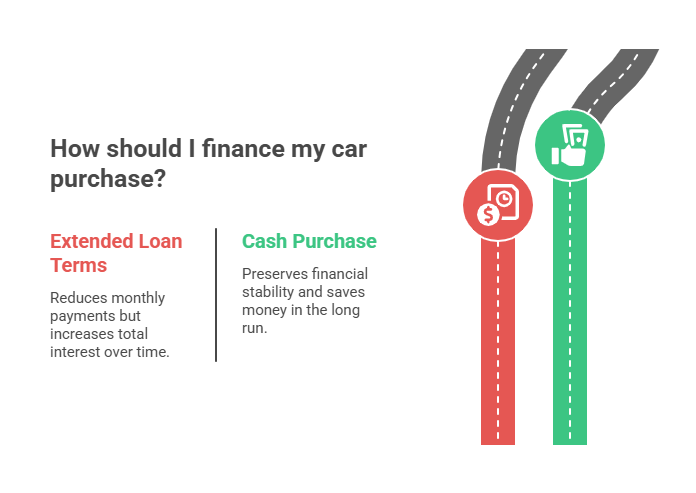Contents
In 2025, deciding between paying cash and financing a car comes down to more than avoiding interest rates. It reflects how most Americans now buy vehicles. According to SCA, nearly 4 out of 5 car buyers (≈79%) choose financing, while only about 18% pay entirely in cash, and the rest lease. The average down payment on financed vehicles has climbed to $6,450, and more than 34% of loans now stretch beyond 72 months, locking buyers into long-term commitments. Paying cash avoids these obligations and keeps you free of lender restrictions, while financing can still make sense if you want to preserve savings, build credit, or access manufacturer-backed incentives.
Pros and Cons of Paying Cash for a Car
Are you going to pay cash for a car? In this case, you own the car outright immediately. This approach eliminates the burden of payment and interest costs. Many buyers prefer this method to avoid debt and simplify their financial obligations. Smart buyers also research cities with lower car prices to maximize their purchasing power. However, paying money requires substantial upfront funds. This method may impact your emergency savings or other investment opportunities.
Pros:
- No monthly car payment or interest to worry about.
- Complete ownership means you can modify or sell the car anytime.
- Better negotiation power with dealers who prefer immediate payment.
- No car loan fees, charges, or credit checks required.
- Protection from repossession if financial hardship occurs.
- Lower insurance requirements since no lender involvement exists.
Cons:
- Large expenses deplete your savings significantly.
- Opportunity cost of not investing that money elsewhere.
- No credit building benefits from making timely payments.
- Less protection if the car has major issues immediately.
- Reduced financial flexibility for other purchases or emergencies.
- Missing potential manufacturer offers tied to finance deals.
Pros and Cons of Financing a Car
Auto loan finance allows you to spread the car purchase over several years. Monthly payment arrangements are vital in this case. This approach preserves your ready money reserves while letting you drive a newer or more expensive car. Finance options also provide opportunities to build credit. Some buyers even explore buying a car at auction to reduce the total amount they need to finance. However, you’ll pay interest over the car loan term and face the obligation of a monthly payment regardless of your changing financial circumstances.
Pros:
- Preserves savings for emergencies and other investments.
- Enables the purchase of a more expensive or reliable car.
- Create a credit history through consistent monthly payments.
- Access to manufacturer offers and special finance rates.
- Potential tax advantages for business car purchases.
- Flexibility to allocate money toward higher-return investments.
Cons:
- Interest charges increase the cost of the car.
- The monthly payment requirement continues regardless of income changes.
- Risk of becoming upside-down if the car depreciates quickly.
- Loan fees and additional charges beyond the car price.
- Full insurance coverage requirements increase monthly expenses.
- Potential repossession if you can’t make a payment.
Key Financial Factors to Consider Before You Decide

Some critical factors, such as monthly income or long-term financial situation, can help you choose the best payment option.
Interest Rates & APR Trends
Current auto loan rates significantly impact buyers’ expenses. Those choosing between financing versus paying cash have to take into account the current economic situation.
Your credit score directly affects the interest rate. Cash is more attractive for borrowers with lower scores. New car loans typically offer better rates than used car loans. Electric car prices have become more competitive. They often qualify for special finance rates. Many buyers wonder: Is it better to buy or finance a car? For some, either option is convenient. You may comfortably afford any variant. Nonetheless, remember: car loan terms ranging from 36 to 72 months affect your monthly payment and total interest paid.
Current Rate Trends:
- Excellent credit (750+): 5.5-7.5% APR for new cars.
- Good credit (700-749): 7.5-10.5% APR for new cars.
- Fair credit (650-699): 10.5-14.5% APR for new cars.
- Poor credit (below 650): 14.5-20%+ APR for new cars.
- Used car rates are typically 1-3% higher than new car rates.
- Credit union rates are often 0.5-2% lower than bank rates.
The average auto loan interest rate for new cars reached 7.8% in late 2024, compared to 4.2% two years earlier.
Your Credit Score
Your credit score makes sense in loan terms. Excellent credit scores can secure lower interest rates that make financing competitive with paying cash. Poor credit scores result in high interest rates that favor cash purchases. Check your credit report before car shopping. The goal is to grasp what rates you’ll qualify for. You’ll address any errors that can impact your score. Let’s say you can’t pay cash for a car. However, if you need to borrow money but have poor credit, you need to adjust your budget expectations.
Tax Implications of Paying Cash vs Financing
The payment method affects your tax situation differently depending on personal versus business use. Cash purchases provide immediate sales tax requirements, while finance spreads this expense. Business buyers may deduct loan interest, making finance more attractive from a tax perspective. Personal buyers generally don’t receive tax benefits from either method, though some states offer trade-in tax credits. When planning for retirement, many financial advisors recommend preserving ready money for long-term investments rather than depleting your bank account for a depreciating asset.
| Aspect | Cash Payment | Financing |
| Sales Tax | Full amount due at purchase | Often included in the loan amount |
| Business Interest Deduction | Not applicable | Deductible for business use |
| Personal Tax Benefits | None | None |
| Trade-in Tax Credit | Reduces the taxable amount | Applied to the loan balance |
| Registration Fees | Paid upfront | May be financed |
What Banks Don’t Tell You About Auto Loan Terms

Lenders often present finance in ways that obscure the true charges and limitations. Extended loan terms reduce monthly payments. However, they dramatically increase total interest over time. Many borrowers focus solely on monthly payment amounts. At the same time, they don’t calculate total loan expenses. Gap insurance, extended warranties, and other add-ons increase your loan amount and monthly requirements. Banks profit from longer-term loans and may steer you toward these options despite higher total expenses. The debate between car loan vs cash often comes down to whether you want to save money in the long run or preserve financial stability today.
Hidden Loan Realities:
- 72-month loans can charge thousands more than 48-month terms.
- Precomputed interest means early payoff saves less than expected.
- Loan origination fees and documentation charges add to the total expense.
- Prepayment penalties may apply to some auto loans.
- Your balance may exceed the car value for several years.
- Missed payment triggers immediate consequences and fees.
How Paying Method Impacts Negotiation Power
Cash buyers often have stronger negotiation positions since dealers receive immediate payment without finance complications. Nevertheless, dealers sometimes make more profit from finance arrangements and manufacturer offers. Understanding these dynamics helps you negotiate effectively. There’s no such thing as a universal best approach.
The key is separating price negotiations from finance discussions. Negotiate the best car price first, then decide whether cash payment or dealer finance offers better overall value after considering all charges and offers available. Some buyers find that cash paid for cars gives them more leverage during negotiations. This approach also helps when planning your next car purchase strategy.
Safety Tips When Paying Cash for a Car from a Private Seller

Private party purchases with cash require extra precautions. First, you lack dealer protections. Consider verifying vehicle history during any purchase. Conduct proper inspections and determine secure payment methods. All these steps help protect you from fraud. Large transactions also create safety concerns that require careful planning and execution. Many buyers can’t pay cash for a car at certain dealerships. Sellers sometimes have exclusive arrangements with specific lenders.
Essential Safety Measures:
- Meet in public places (a bank or police station).
- Verify the seller’s identity matches the title exactly.
- Use a VIN decoder to check the vehicle’s complete history.
- Arrange independent mechanical inspection before purchase.
- Bring a companion and inform others of your meeting plans.
- Use cashier’s checks or bank transfers instead of cash when possible.
- Verify a clear title with no liens or legal issues.
- Document the transaction with proper bill of sale paperwork.
Can You Pay Partially in Cash and Finance the Rest?
Combining cash and finance offers flexibility. A large down payment reduces the car loan amount. It lowers the monthly payment and total interest while preserving some reserves. This hybrid approach can secure better loan terms. Most lenders and dealers accommodate this arrangement, though minimum loan amounts may apply. Making monthly payments on a smaller balance while keeping less cash helps provide the best of both worlds.
SCA Pro Tip: When you combine cash and financing, aim for a down payment of at least 20%. According to SCA’s 2025 buyer data, buyers who put 20–30% down typically qualify for better loan terms and save an average of $1,200–$1,800 in interest over the life of the loan.
What Happens If You Total a Financed vs a Cash Car?

Insurance claim processes differ significantly between owned and financed cars, affecting your financial recovery after an accident. Cash owners receive insurance payouts directly and keep any surplus after repairs or replacement. Financed car owners must typically pay off the remaining amount first, potentially leaving them with nothing if the car’s value is less than what they owe. Getting a new auto loan after a total loss while still owing on the previous car creates new debt requirements that strain your budget.
| Scenario | Cash-Owned Car | Financed Car |
| Insurance Payout | Goes directly to the owner | Goes to the lender first |
| Remaining Balance | No obligations | Must still repay the loan |
| Gap Coverage | Not needed | Highly recommended |
| Replacement Timing | Immediate with payout | After the loan settlement |
| Out-of-Pocket Costs | Deductible only | Deductible plus loan balance |
| Title Transfer | Owner handles directly | Lender involvement required |
23% of financed vehicles are worth less than their loan balance at any given time. This creates potential financial gaps after total loss accidents.
Summary
Paying cash or financing during a used or new car purchase requires careful consideration. Pay attention to your credit score, available savings, and financial goals. Cash eliminates interest and provides complete ownership. Finance preserves liquidity and can build credit. Consider current interest rates. Review the manufacturer’s offers. Think through your long-term financial strategy. Try to balance immediate expenses with future financial flexibility and growth opportunities. Grasping the distinction between car note vs car payment terminology can help make an informed buying decision.
FAQ
Why Do Car Dealers Push Leasing?
Dealers earn higher profits from leasing. It’s due to financing company commissions and increased service revenue. Leases also create repeat customers who return every few years for new vehicles.
Is the Cash Price for a Luxury Car Usually Lower?
Luxury car prices aren’t automatically lower. Dealers often profit more from financing arrangements. However, cash buyers may negotiate better deals. They can eliminate financing complications and demonstrate serious purchase intent.
Can You Return the Car to the Dealership If You Paid in Cash?
Cash purchases typically don’t include return policies unless specifically negotiated. Unlike financing arrangements, ready money sales are usually final. Pre-purchase inspections and research are even more critical for buyer protection.
Can I Pay Cash for a Car and Still Be Denied the Sale?
Yes. Dealers can refuse cash sales for various reasons. These include concerns about money laundering, incomplete documentation, or preferring financing customers. Private sellers may also decline if they suspect fraudulent money sources.
What’s the Biggest Mistake Cash Buyers Make at Dealerships?
Cash buyers often reveal their payment method too early. Smart buyers negotiate the best vehicle price first. Then, they explore whether cash or financing provides better overall value.
Common Cash Buyer Mistakes:
– Announcing ready money payment before price negotiations.
– Failing to research manufacturer financing incentives.
– Not comparing total costs between cash and financing options.
– Skipping pre-purchase inspections due to overconfidence.
– Neglecting to verify all documentation and fees upfront.
– Missing opportunities to invest the cash elsewhere for higher returns.





